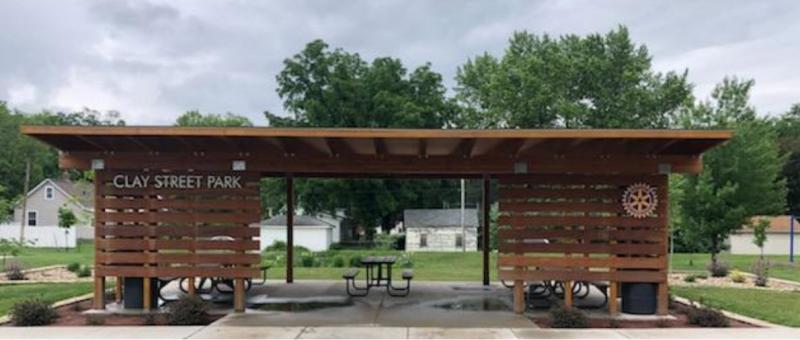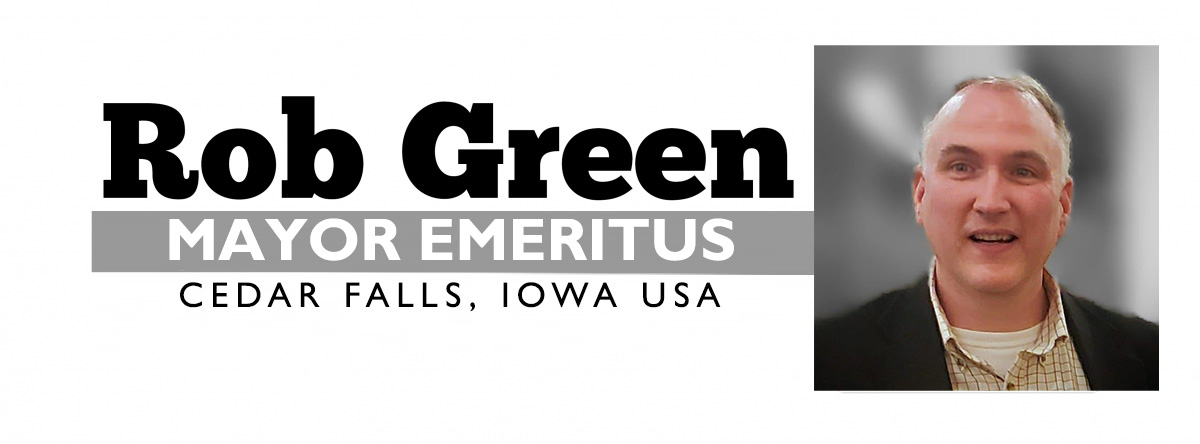
America's cities and towns have a unique and vital role to play in the life of the American republic. As we celebrate Independence Day, I'll take a few minutes to explain why I believe our community relationships are so important, and why all mayors must step up and serve as "connector-in-chief" for the community.
I've just finished a thought-provoking book from the library called Them: Why we hate each other and how to heal, by Ben Sasse. The author's main point is that much of the us-versus-them-ism we see in American society today (whether at the national, state, or local level) is due to the isolation and loneliness that's crept into our lives through smartphones (dare I say 'addiction'?), the demands (and transience) of a mobile economy, and the resulting lack of a sense of 'rootedness' in a community. We crave connectivity and are often seek it in unfulfilling places, to the detriment of our communities and society.
My Own Story of Rootedness
As a kid in Northeast Florida, I didn't live in one place long; as a case in point, I attended four high schools in four years. And in a decade with the Coast Guard, I moved to new coastal cities six times. So in the summer of 2004, when deciding where to settle down and raise a family, it was a no-brainer to choose Eastern Iowa, near where my wife, Jocelyn, grew up. It was a leap of faith, but in Cedar Falls I saw a growing, dynamic city with tremendous resources and opportunity for a civic-minded entrepreneur (and a brand-new public library!).
Fast forward fifteen years, and I can say that things have worked out very well, and I'm content with life -- and much of that, for me, is because of my sense of rootedness in my community. I greatly enjoy the challenge of my work as a web developer and college instructor at UNI, my five-minute bike commute to campus every day, the terrific (and inexpensive or free) activities to do with my family in the evenings & weekends, and the trusting, positive relationships I've built over the years with neighbors, co-workers, my church family, and great community thinkers and doers. I'm not going to presume that this is the prescription for happiness in your life, but I suspect that some of this rings true for many residents of Cedar Falls. We're proud of our town, our schools, our sports teams, and our history, and desired to be part of a community (whether a little or a lot)...if only we knew how.
So what does this have to do with city government, and the mayor?
Over the past several years, I've thought a lot about how Cedar Falls can improve 'connectedness' and help residents find and maintain a shared sense of identity and purpose...the kind of big-question existential happiness that is often now grasped for in so many other unfulfilling ways...evidenced by worsening mental health, increasing addiction to social media, and other negative social symptoms. Cedar Falls is no dystopia, but we always have room to improve. That said, I don't believe that local government can (or should) step in to resolve the loneliness and isolation which has crept into our society, but there ARE specific and warranted actions which I believe are appropriate for City Hall to take to support a civic environment of connectedness. Here are my top five:
1. Foster the creation of more neighborhood associations and a Neighborhood Services Committee. As a former neighborhood association president, I know first-hand the value of belonging to a neighborhood group which is independent of (and not beholden to) the municipal government. The mayor should actively encourage natural leaders to form and nurture voluntary neighborhood associations which have a voice and power within City Hall. A city-chartered Neighborhood Services Committee, made up of the heads of all the neighborhood associations, could work together to identify and coordinate initiatives outside the jurisdiction of municipal government (like neighborhood cleanup days).
2. Highlight and promote the value and impact of our area service organizations. Nationwide, service club membership is graying -- and plummeting. I'm a member of the Rotary Club of Cedar Falls (we meet Tuesday at noon at Windcove)...one of my favorite aspects is volunteering to make & sell popcorn at the summer Tuesday band concerts at Overman Park, as a fundraiser for the band. Many of these important activities and events in the life of our community rely on voluntary service organizations (Rotary, Kiwanis, Masons, AMVETS, Exchange, Lions, Scouts, and others). While City Hall sometimes coordinates the work (like the Clay Street Park playground upgrade), it's critical to show residents how vital these service organizations are to the effort & fundraising. Something simple we could do? A service organization sign like many towns have. It's in our Capital Improvement Plan -- but it should've been built years ago, and as mayor, I'd push to ensure it happens ASAP.
3. Encourage pedestrian-friendly and neighborhood-making development through new zoning code. Our zoning laws are antiquated, and I'm very happy that we're re-tooling them for a new generation. The city can promote connectedness through continued use of the 'complete streets' concept -- and by encouraging the development of homes with windows to the street...and where the sole architectural feature from the street isn't a giant garage door. Also, as we seek to build out our "mixed use" zoning areas, the city needs to be more deliberate about the "neighborhood-making" which is expressly written into the code. A travel-plaza sized Kwik Star on Greenhill Road does not help to make a neighborhood. On the other hand, the College Hill Kwik Star does. The mayor needs to have the vision and imagination to appreciate the difference, and facilitate accordingly (and veto, as necessary).
4. Engage and inform residents, and encouraging participation in the civic debate. For residents to gain a sense of agency in local civic life, the city should do more to encourage participation and dialogue. This isn't to say that we will all agree and sing kumbaya at the end of the day. But important decisions need public buy-in. Rootedness and connection means giving the public the information it needs to make informed decisions....something is broken when we can only have a referendum on new public buildings (like the $11M Public Safety Building) if we're financing it with debt. It's a symptom of a larger problem that I see within our government -- that residents are expected simply to trust the wisdom and experience of our elected leaders, and that public involvement is a "distraction" from our work as a city council (which a council member told me last year). Granted, it would be disastrous to shift to the extreme of populism (or worse yet, mob rule), but the more engaged and informed our residents are (through the provision of unbiased information and ample opportunity to respond & dialogue on it) the healthier and stronger our city will be.
5. Invest in our neighborhood playgrounds and simple public spaces. One of my most lasting memories from my 2017 city council campaign was seeing new housing developments with chain-linked yards and identical backyard playsets. The neighborhood had no public park. Each identified neighborhood in Cedar Falls should have its own centrally located neighborhood 'living room' -- a park/playground with sheltered seating, benches, and chain-link protection for wandering little ones. Clay Street Park was recently upgraded in this way, thanks to the fundraising and labor of Rotary Club, with the support of the City. I believe these smaller enhancements are a much smarter government investment for quality-of-life than large projects which directly benefit viewer people (I'm thinking of the proposed whitewater course for the Cedar River). I realize that in the big scheme of things, new and improved playgrounds are a small investment, but kids playing together (and their grown-ups talking together) is the start of friendships and supportive neighborhood relationships with lasting impact. And I want Cedar Falls to encourage it.
So, Back to Independence Day...
As I'm going about my civic life, I sometimes have "America moments"....maybe you do, too. It's a sense that, "This is what America's all about". For me, these times always involve neighbors and my fellow residents....particularly when carrying the Coast Guard wreath in my dress white uniform for the AMVETS on Memorial Day, and as I'm walking through Overman Park with my son, selling popcorn for a dollar for Rotary Club. As my kids grow up, head to college & careers and (hopefully) come back to raise their own family, I want to do my best to pass on to them an inheritance of "America moments" for their children and grandchildren. And for yours, too.
By re-connecting and establishing strong local roots and ties through the initiatives above -- and in other big and little ways -- I'm confident we can weather the various local controversies of the day, and model (for America!) the kind of respectful, generous and empathetic public discourse needed to solve national challenges as well. To debate with dignity. In the words of Judge Learned Hand,
"The spirit of liberty is the spirit which seeks to understand the minds of other men and women; the spirit of liberty is the spirit which weighs their interest alongside its own without bias."
How much easier would it be to understand others, and to be willing to appreciate their point of view, if we were already connected and engaged in other positive ways? As mayor of Cedar Falls, this would be a key focus for me as the city's "Connector-in-Chief"....because I realize that our connectedness -- and the example we set -- will have major implications for our community, and possibly even America, in the decades ahead.
